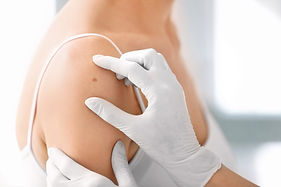FAQ's
What is nodular basal cell carcinoma?
Nodular basal cell carcinoma is a type of skin cancer that originates in the basal cells of the skin's outer layer. It typically appears as a flesh-colored or pinkish bump with a shiny or translucent surface.
What causes nodular basal cell carcinoma?
The primary cause of nodular basal cell carcinoma is prolonged exposure to ultraviolet (UV) radiation from the sun or tanning beds. Genetic factors and a history of sunburns can also increase the risk.
How is nodular basal cell carcinoma diagnosed?
Diagnosis often involves a visual examination by a dermatologist, followed by a biopsy, where a small sample of the suspicious tissue is taken and examined under a microscope by a pathologist.
What are the signs and symptoms of nodular basal cell carcinoma?
Common signs include a shiny or pearly bump on the skin that may bleed or develop a crust, a sore that does not heal, a scar-like area without a known cause, or a pinkish patch of skin. It may also appear as a non-healing ulcer.
Is nodular basal cell carcinoma dangerous?
While basal cell carcinoma rarely metastasizes (spreads to other parts of the body), it can be locally destructive if left untreated, causing disfigurement and damage to surrounding tissues. Early detection and treatment are essential to prevent complications.
What is the prognosis for nodular basal cell carcinoma?
The prognosis is generally excellent, especially with early detection and appropriate treatment. However, regular follow-up appointments with a dermatologist are recommended to monitor for any signs of recurrence or new skin cancers.
